Mysticism and Meaning Meet in an Ohio Artist’s Gardens
Every garden, every landscape we create has a story to tell. It’s why we do what we do: to express ourselves. We have something to say. It could be as direct as stating our love of good, fresh food by way of a healthful vegetable garden, or as thoughtful as honoring the forces of nature by embracing native, sustainable landscaping — not only in times of drought but as an ongoing, respectful dialogue with Earth’s precious resources.
Nancy Drobnick has been telling wondrous outdoor stories since 2000, when she and husband Cliff purchased 3 acres of wooded riverfront property outside the village of Chagrin Falls, Ohio, northwest of Cleveland. Their first task was to restore the long-abandoned cottage, which was so dilapidated they found snakes in the wall. Today, with its 51 skylights, the cottage is among the showcase installations Drobnick has built on the site of their part-time home and her land art company, Miriam’s River House Designs.
The tales Drobnick’s designs tell are like fables or myths — all are deeply personal and crafted for clients and others seeking what she has laid out on the once-wild Ohio landscape: gardens of secret, metaphysical delights. Her award-winning landscapes and designs draw from mathematics, physics and astronomy for inspiration; they pull from philosophical, religious and cosmic concepts. Drobnick’s creations are so loaded with deeper meanings that psychologically speaking, they’re a wonderland of Jungian symbolism.
While many landscapes follow similar pathways — feng shui–inspired landscapes, for example — metaphysical design, says Drobnick, “incorporates all sorts of ideas, not just one approach,” creating a complete storyline from the psyche that is unique to each client.
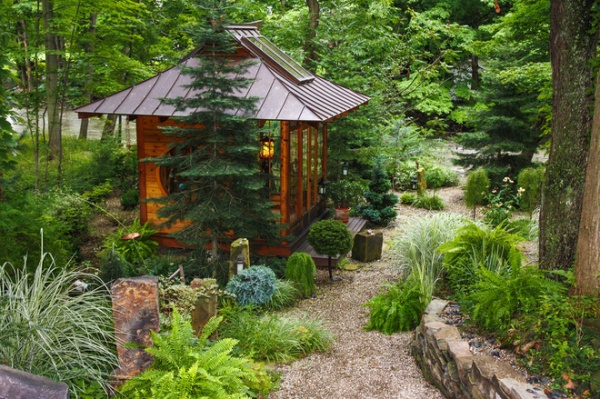
Photos by Dan Drobnick
Yard at a Glance
Who lives here: Cliff and Nancy Drobnick
Location: Chagrin Falls, Ohio (near Cleveland)
Size: 3 acres
The Drobnicks live in the restored cottage about eight months each year. At other times it and grounds are open to retreats, meetings and tours for groups, including members of the Cleveland Botanical Garden and the Western Reserve Herb Society.
It’s also an en plein air space for potential clients, who can meander through the grounds and experience the transcendental designs — incorporating buildings, interiors and gardens — resident there, including this Japanese teahouse and its roji garden. Here, traditional elements share time and space with symbolic bits and pieces drawn from a myriad of mystical sources, numerology among them.
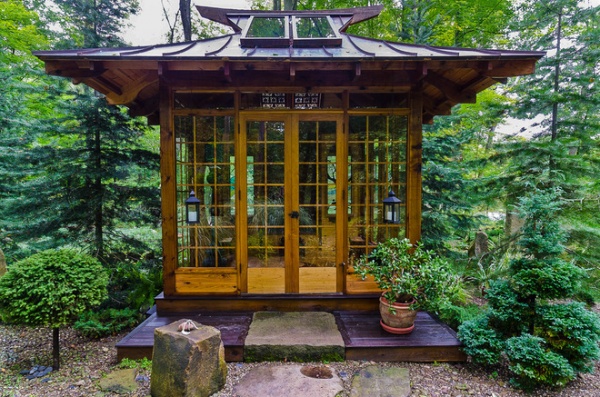
“When you step into a roji garden, you are stepping into another dimension,” says Drobnick of the roji’s role in the greater tea garden experience.
It’s an appropriate starting point for what is at the conceptual heart of this particular installation: the idea of infinity. Eight varieties of wood were used to craft the teahouse. Whether lying on its side or upright, the numeral 8 is the symbol for infinity, so designated by many numerologists for the continuous movement one makes when drawing it.
The teahouse sits 13 inches off the ground, also in reference to numerology and specifically to the number 4 — numerology reduces all numbers to a single digit (1 + 3 = 4) — which speaks to consciousness raised to “a state of beauty,” says Drobnick.
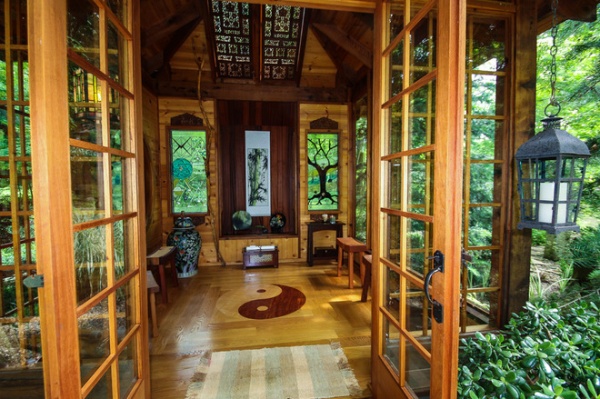
There are also four skylights in the teahouse — and three windows, the latter in reference to the kabbalah, an ancient Jewish mystical teaching that assigns the number 3 to time, space and matter.
The philosophy behind Drobnick’s unique designs is translating a client’s innermost thoughts into something that can be used and enjoyed, she says — and, if desired, to inspire deeper discussions.
For clients who choose a teahouse of their own, Drobnick also ensures that the placement of the building and the grounds and gardens around it are all properly aligned — that the chi, or spiritual energy, of the entire site is intact.
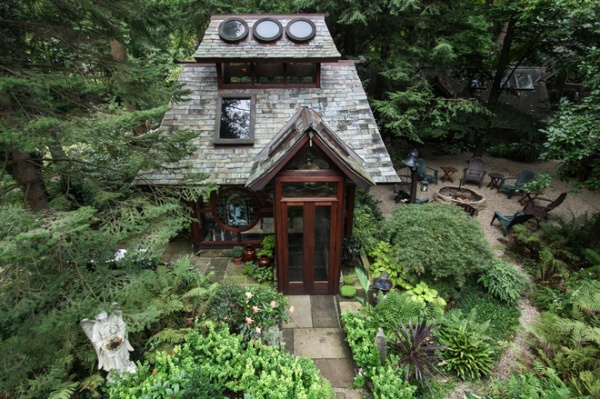
Water, the fluidity of consciousness, energy moving in and out of us: These are the ways Drobnick describes the inspiration behind the Meditation Pavilion, another installation and fittingly set in an enclosed, private garden. Like all her designs, this is one of a kind and specific to its purpose: meditation, spiritual reflection, healing. It is also intimately connected to the number 9, “a beautiful number,” says Drobnick. “Nine permeates the building.”
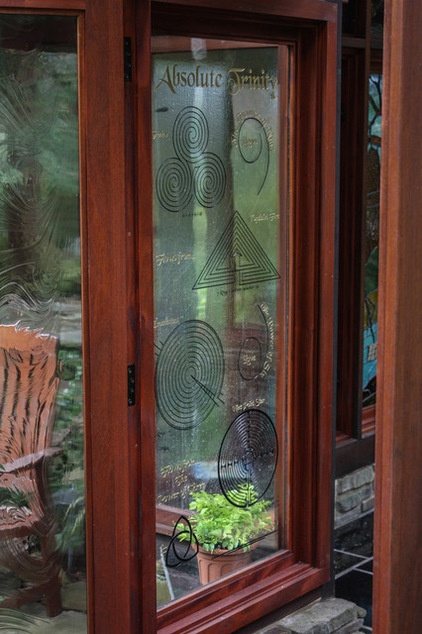
In numerology, 9 represents “the gestation of energy,” she says, “when energy reaches its pinnacle, the step before the ‘aha’ moment.”
Shown here is one of Drobnick’s specialties: art glass windows, all of which are unique to the space and the client. Each is copyrighted and comes with a book that details the metaphysical meanings of the design.
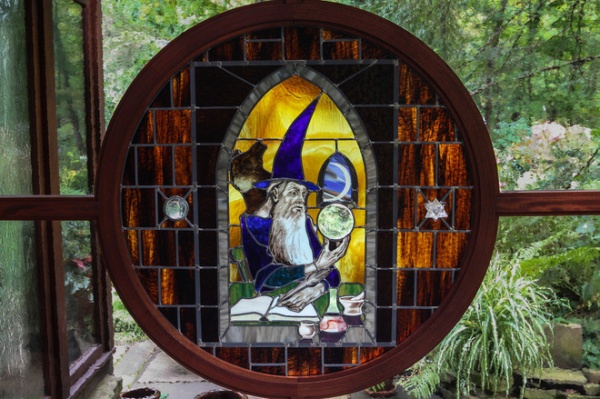
Another art glass window in the Meditation Pavilion: Here we are looking through a window at an alchemist who sits in front of another window that looks out on a half moon.
Throughout the glass tableau, Drobnick has called on symbols representing consciousness and being: The alchemist, with the wise owl on his shoulder, is consulting his crystal ball, but not to learn his fortune. He’s seeking knowledge about “where his soul is going,” says Drobnick, who adds that the alchemist is “refining his spirit — positive thinking can change us.”
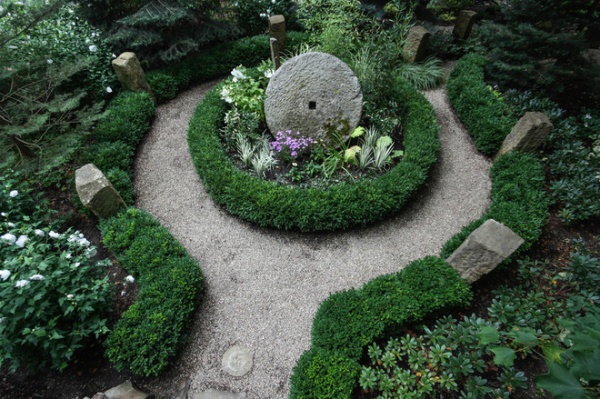
Our place in the universe is the theme of the Sun/Moon Garden, pictured here, which won a gold award for international landscape design from the Association of Professional Landscape Designers in 2014.
As is true in all her creations, everything in the installation has a reason and a meaning, from the colors of the flowers — representing the hues of seasonal days and nights — to the central sun stone: It’s a hand-carved millstone rescued from an Ohio quarry. Eight reclaimed barn stones representing the planets stand within seven rings around the sun stone — 7 being a sacred number symbolizing mystery and knowledge.
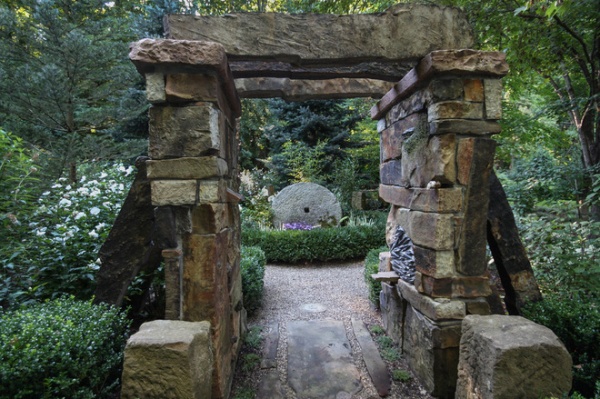
This massive stone arch stands at the entrance to the Sun/Moon Garden. It too is rife with symbolism, and the stones used to construct it also have a story to tell — Drobnick describes them as “cosmic eggs.”
Native to Ohio, the stones are remnants of the time when glaciers covered the area. Rocks like these often reveal glacial striations — scratches or gouges left on the surface by glacier movement. Striations speak to these ancient glacial movements, of origins and geologic eras, just as the mythic cosmic egg speaks of primordial entities and the birth of the universe.
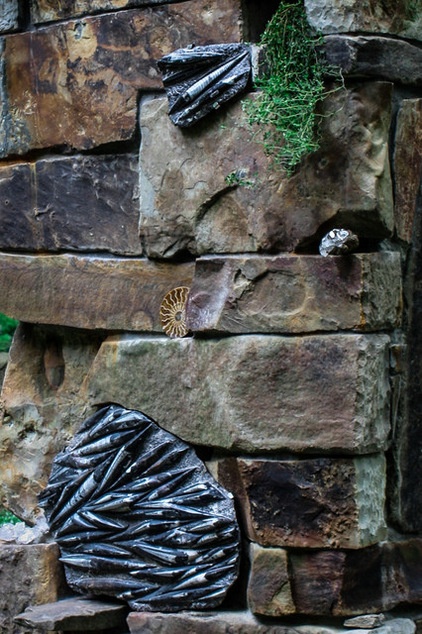
Also notable in the arch is an opening in the inner wall of the south-facing pillar, which allows the sun to shine through and illuminate the opposite pillar — in Drobnick’s design, the two together represent the dawn of the universe.
Evolution is symbolized by the collection of adornments on the pillar exposed to the sun, with granite fossils of ancient swimming creatures serving as a dramatic centerpiece.
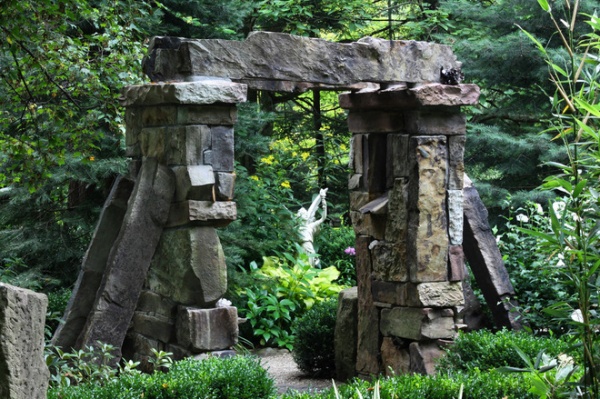
Symbolically, for Drobnick, the Sun/Moon Garden and its pathway represent the “conscious awakening of the planet,” but they also serve as a metaphor about our collective experience with the universe, the one within and the one beyond.
Not to fret if the idea of getting lost in the universe comes to mind. As this view of an angel with a torch beyond the garden signifies, “we can always find our way home,” says Drobnick. “The garden is a deep meditation about going out and coming back.”
More:
What Kind of Gardener Are You? Find Your Archetype
How to Create an Unforgettable Garden












